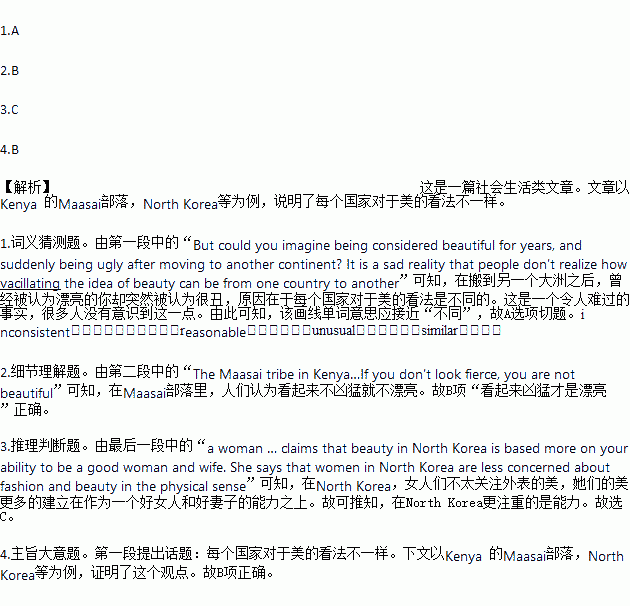题目内容
Many young people these days adore the advertised magazine body and become too focused on attaining this image instead of worrying more about what lasts and even grows over time. But could you imagine being considered beautiful for years, and suddenly being ugly after moving to another continent? It is a sad reality that people don’t realize how vacillating the idea of beauty can be from one country to another.
Think of the most typical American girl you know. Is she blonde haired with white skin and light eyes, and does she love shopping or sports? Now place this girl in the heart of Africa, a place where beauty is placed on what you can control. The Maasai tribe in Kenya focuses on how clean people are, and how stylish their piercings (穿孔) are. This tribe’s culture is to be a brave fighter, so they will cut their skin with patterns in it to show that they are strong. If you don’t look fierce, you are not beautiful.
Other countries like North Korea and South Korea have their own unique views on beauty. In an interview, a woman who has lived in both North and South Korea claims that beauty in North Korea is based more on your ability to be a good woman and wife. She says that women in North Korea are less concerned about fashion and beauty in the physical sense. She says they did have a time when big eyes were a big deal and everyone wanted to get double eyelid surgery. This is something extreme and could perhaps be influenced by Western culture. And the idea of getting surgery done to look more attractive is crazy.
1.What does the underlined word “vacillating” in Paragraph 1 probably mean?
A. Inconsistent. B. Reasonable. C. Unusual. D. Similar.
2.The Maasai tribe in Kenya is mentioned to show that in their eyes _______.
A. getting dirty is stylish
B. looking fierce is beautiful
C. strong people cut their skin
D. American girls love shopping
3.According to the woman interviewed, women in North Korea now_______.
A. care a lot about their appearance
B. put the beauty of eyes in the first place
C. pay great attention to their ability
D. are crazy about double eyelid surgery
4.What does the text mainly tell us?
A. Inner beauty is of great importance.
B. Ideas of beauty vary among culture groups.
C. Different ways are needed to admire true beauty.
D. Fashion magazines easily influence young people.

